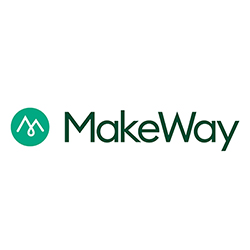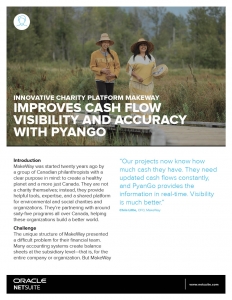Case Study: MakeWay
By: Rich Uphus | September 10, 2020
MakeWay was started twenty years ago by a group of Canadian philanthropists with a clear purpose in mind: to create a healthy planet and a more just Canada. They are not a charity themselves; instead, they provide helpful tools, expertise, and a shared platform for environmental and social charities and organizations. They’re partnering with around sixty-five programs all over Canada, helping these organizations build a better world.
The unique structure of MakeWay presented a difficult problem for their financial team. Many accounting systems create balance sheets at the subsidiary level—that is, for the entire company or organization. But MakeWay needed a method to generate balance sheets for each of the dozens of programs they’re partnering with.
They were already in the process of migrating to NetSuite from their previous system. Chris Little, CFO at MakeWay, explains the reason for this migration: “Our old system was heavily, heavily customized, to the point where it was tough to do any updates. What we wanted was something with more flexibility, something that was in the cloud that we could easily integrate with other systems.” For this, they turned to NetSuite, which gave them all that, as well as “a CRM, online storage, a new expense and invoicing system, new payroll system, the whole thing.”
In the process of implementing NetSuite, they came to realize they needed a way to extend some of NetSuite’s functionality. Little explains, “We needed fund accounting on the balance sheet, which is not something most charities need, but we do, because of our structure. We provide a shared platform of support to around 65 projects across the country, and they each need their own suite of financial statements, with a balance sheet to know what their cash is, their accounts receivable, and all those things.” So MakeWay began investigating how to extend NetSuite’s functionality to give them that added fund accounting ability.
“We went digging, and PyanGo just seemed like the best fit for what we needed. It was simple to implement, and we were able to get accurate balance sheets: the key ones, cash, AR, AP. That’s the stuff our projects want to know. We were able to set up those key accounts so that we can do accurate balance sheets for each project,” Little says.
One advantage of PyanGo is that it is native to NetSuite; it is not a third-party plug-in that must be integrated with NetSuite. Mike Canniff, CEO of PyanGo, explains why that matters: “Doing an integrated solution wouldn’t be very effective because you’d have to export all of the data, then do the balancing, then push the data back into NetSuite.” A natively built application for the NetSuite ecosystem has many benefits: “It’s real-time; every transaction is balanced as it occurs in NetSuite,” Canniff says. And a native-built solution can use the Suite GL feature within NetSuite: “PyanGo adds the correct general ledger impacts right alongside the transaction. We’re not creating additional transactions that might have to be either exported and imported back and forth between NetSuite and some other system; it’s all living within the NetSuite database.”
The team at MakeWay was pleased with the functionality that PyanGo added to NetSuite. “We would have been challenged to go live without PyanGo,” Little says, “because we needed to see the cash balance for each project. Our projects now know how much cash they have. They need updated cash flows constantly, and PyanGo provides the information in real-time. It’s critical for managing the project and the project activities.” She adds, “Visibility is much better; I like that functionality.”
The ability to generate balance sheets for individual funds was vital to MakeWay’s mission to support multiple programs and groups.
Canniff explains, “In a for-profit environment, most companies don’t need to report at that project level, or they don’t have the concept of a fund. But in non-profit, that’s where the fund segment becomes very important. Some nonprofits
have to report back to their donors or constituents to say, ‘Here is the balance sheet for all transactions related to your donations.’ It becomes critical that they can generate that by fund.”
He calls fund accounting “the lifeblood” of donor reporting required of non-profits. “They need to be able to report back to constituents on a fund-by-fund basis. Without fund accounting, that becomes almost impossible in a standard general ledger system. But with fund accounting, they can present that position for each fund. And that ensures compliance with the donors’ terms and conditions, as well as a more complete financial position that they might need to report to various stakeholders.”
Little confirms that this ability is vital for MakeWay: “Fund accounting is a core piece of functionality that PyanGo provided. It probably sounds small, but for us, with the way we run the shared platform for all these projects, it’s a really, really critical piece of functionality.”
MakeWay was also pleased with the accuracy of their new system. They had found their previous system to be error-prone: “It was giving us all kinds of incorrect data. We noticed in moving to the new system that it’s a much more robust structure in its reporting. So accuracy has gone up,” shared Little.
Canniff explains that PyanGo increases accuracy because it eliminates manually entering transactions. “And this increases productivity because now the accountants can really focus on their core jobs, rather than entering debits and credits. And they’re no longer devoting time to chasing down why this particular fund is out of balance to other funds.”
Little calls their new system’s impact on the number of errors “significant.” “I feel like we have much more accurate reporting than with our previous system. The system that we had required a lot more resourcing to keep all those reports accurate and up to date.”
Great Implementation and Support
The MakeWay team discovered that implementing PyanGo would not take a lot of time: “It was fairly seamless and easily implemented in NetSuite,” says Little, “which was helpful because we were on a tight timeline. It was good to be able to find a solution that was fairly easy to implement and would work quickly. It didn’t impact our timelines.”
And she was pleased with the team at PyanGo, who were helpful when a challenge cropped up. Canniff explains, “In NetSuite, there’s something called Suite GL architecture plug-ins, and it’s set up so you only have one active plug-in at a time. But MakeWay required two—the PyanGo Fund Accounting plug-in for the self-balancing, and one for taxes. We were able to work with the MakeWay IT team to figure out a solution that allowed the plugins to work in sequence or tandem with each other. PyanGo’s custom solution solved the implementation problem, so MakeWay can seamlessly handle both requirements within the provided NetSuite architecture.”
“They were great,” says Little of the PyanGo team. “Very, very responsive.” She’s also been pleased with the support that they’ve received since implementing their new system. “When we’ve had any questions, or there have been updates, the PyanGo team has been very responsive. They are knowledgeable and fast, and they know the NetSuite product very well.”
Click here to request a demo or arrange a no-obligation consultation with one of our experts.






